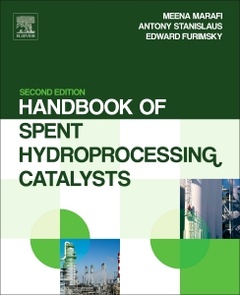Handbook of Spent Hydroprocessing Catalysts (2nd Ed.) Regeneration, Rejuvenation, Reclamation, Environment and Safety
Auteurs : Marafi Meena, Stanislaus Anthony, Furimsky Edward

Handbook of Spent Hydroprocessing Catalysts, Second Edition, covers all aspects of spent hydroprocessing catalysts, both regenerable and non-regenerable. It contains detailed information on hazardous characteristics of spent and regenerated catalysts. The information forms a basis for determining processing options to make decisions on whether spent catalysts can be either reused on refinery site after regeneration or used as the source of new materials.
For non-regenerable spent catalysts, attention is paid to safety and ecological implications of utilizing landfill and other waste handling and storage options to ensure environmental acceptance. As such, this handbook can be used as a benchmark document to develop threshold limits of regulated species.
1. Introduction 2. Developments in Petroleum Refining 3. Hydroprocessing Technology 4. Catalyst Deactivation 5. Regeneration 6. Rejuvenation 7. Cascading 8. New Catalysts From Spent Catalysts 9. Environmental Applications of Spent Hydroprocessing Catalysts 10. Valuable Materials From Spent Hydroprocessing Catalysts 11. Metal Reclamation From Spent Hydroprocessing Catalysts 12. Spent Unconventional Hydroprocessing Catalysts 13. Environmental and Safety Aspects of Spent Hydroprocessing Catalysts 14. Markets and Price Trends for Metals in Spent Hydroprocessing Catalysts 15. Future Perspectives
Chemists and chemical engineers in catalysis as well as to catalyst regenerators, catalyst manufacturers, metal reclaiming companies as well as governments and agencies involved in regulatory affairs. For decision makers, the Handbook serves as guidance with respect to developing new and improving existing strategic options for refining industry.
Dr. Stanislaus has over 30 years of research experience in catalysts and processes related to petroleum refining. His research experience includes: upgrading of petroleum residues by catalytic hydroprocessing, deep desulfurization and aromatics hydrogenation of diesel blending streams (clean fuels production), naphtha catalytic reforming for octane improvement, kinetics of hydrotreating reactions, catalyst deactivation and regeneration, spent catalyst reactivation and utilization, catalyst development, characterization, and performance testing. He has published over 100 scientific papers in International Journals and books.
Dr. Furimsky has some forty years of research in the conversion of petroleum, coal and natural gas to various commercial products. The studies on upgrading petroleum feeds included hydrodesulfurization, hydrodenitrogenation, hydrodeoxygenation, catalyst deactivation and regeneration. The environmental and safety aspects as well as utilization options for spent refinery catalysts were part of the research as well. Scientific productivity includes two books, several book chapters and a dozen of reviews on various aspects of hydroprocessing catalysis, petroleum refining and utilization of refinery residues. Some 130 articles appeared in the referred scientific journals.
- Includes experimental results and testing protocols which serve as a basis for the development of methodologies for the characterization of solid wastes
- Presents a database which assists researchers in selecting/designing research projects on spent catalysts, i.e., regeneration vs. rejuvenation and metal reclamation
- Provides the environmental laws, acts, and liabilities to raise awareness in safety and health issues in all aspects of spent catalysts
- Contains solid waste management procedures specific to hydroprocessing that serve as a model for designing research projects in other solid waste areas
Date de parution : 01-2017
Ouvrage de 468 p.
19x23.3 cm
Mots-clés :
Abrasives; Alloys; Bifunctional catalysts; Bioleaching; Bricks; Catalyst activity; Catalysts for slurry bed; Ceramics; Classification of solid waste; Coke formation; Coke removal; Coke; Commercial processes; Commercial regeneration processes; Construction materials; Conventional metals; Deactivation kinetics and modeling; Deactivation; Development and properties of catalysts; Developments in petroleum refining; Disposal in landfills; Economic assessment; Environment and safety of refining; Environment and safety; Environmental and safety regulations; Gas purification sorbents; Guard bed trap; Hazardous solid wastes; High severity�Low severity; Hydrocracking; Hydroprocessing feeds; Hydroprocessing reactors and systems; Hydroprocessing; Leaching with inorganic agents; Leaching with organic agents; Metal reclamation; Metals deposition; Metals separation; Modeling of regeneration; New catalysts from spent catalysts; Noble metals; Organic and inorganic leaching agents; Oxidative desulfurization; Oxidative regeneration; Petroleum refinery; Petroleum; Platinum group metals; Poisoning and inhibition of catalysts; Precious metal-containing catalysts; Reductive regeneration; Refractories; Regeneration and rejuvenation; Rejuvenation kinetics; Rejuvenation modeling; Rejuvenation plant design; Selective catalytic reduction; Spent catalyst deactivation; Spent catalyst recycling by regeneration and rejuvenation; Spent catalyst reprocessing; Spent catalyst; Spent catalysts; Spent hydroprocessing catalysts; Synthetic aggregates; Unconventional catalysts; Waste water treatment agents; World crude oil supply


